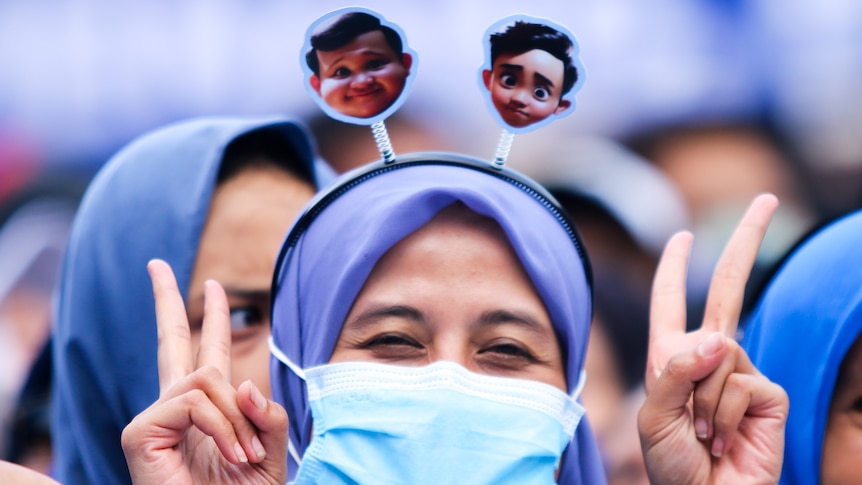AI in Election Campaigns
The recent election campaigns in Pakistan, India, and Indonesia provide insight into the impact of artificial intelligence (AI) on the strategies and dynamics of elections, often leading to unforeseen and remarkable shifts.
Revolutionizing Election Campaigns with AI
Farah Puteri Nahlia, during the recent Indonesian election campaign, utilized AI to gain insights into her electorate, creating a cutting-edge campaign strategy.
Through the innovative program, Pemilu.AI, a vast array of data sources, including government census records, sentiment analysis from local social media platforms, commodity pricing trends, and detailed voting statistics, were analyzed to paint a comprehensive portrait of the community.
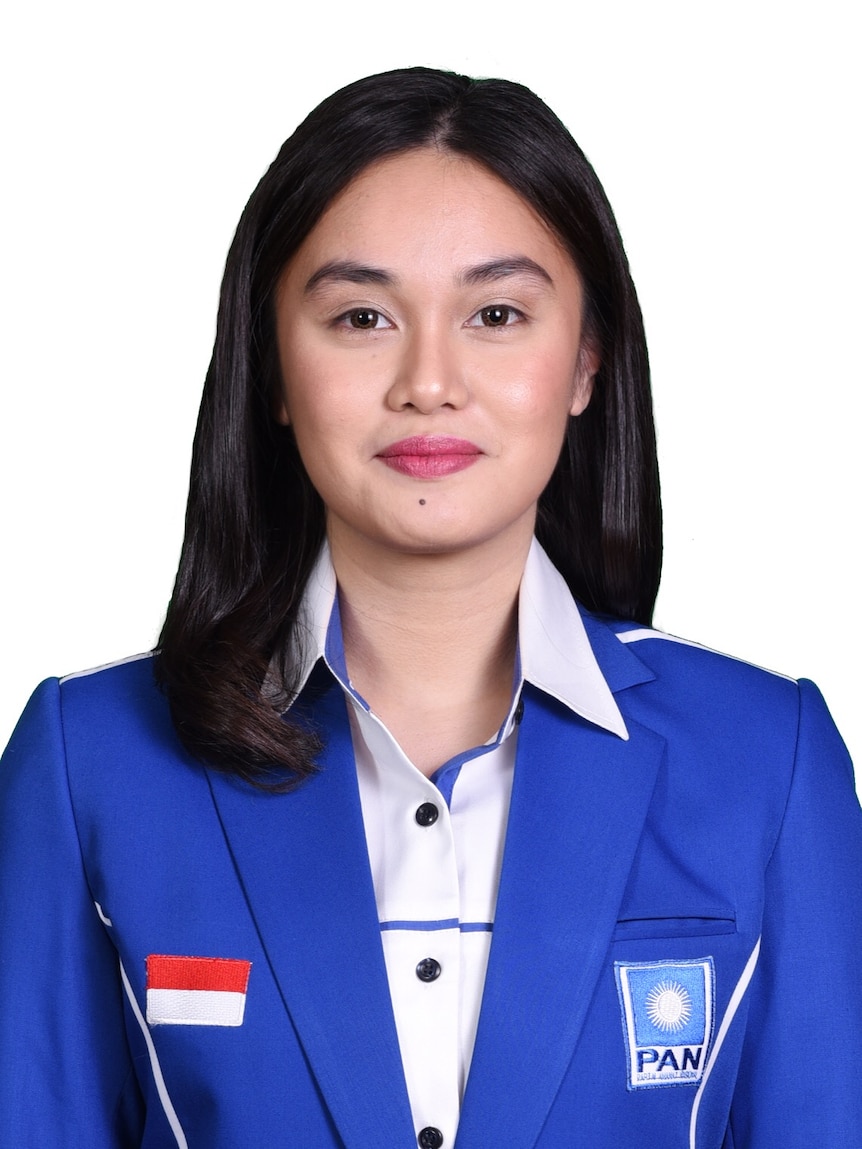
The Impact of AI in Election Campaigns
Farah Puteri, the youngest member of Indonesia’s parliament for the past five years, has been utilizing AI technology to streamline various aspects of her political work. Through AI, she gains insights into education levels, nutrition status, local job opportunities, social media sentiments, and historical voting trends in different polling booths. This innovative approach has significantly simplified her tasks and reduced the need for extensive manpower in the field.
According to Farah, AI not only analyzes data but also assists in generating speeches, social media content, and campaign merchandise designs. The utilization of OpenAI’s GPT-4 and 3.5 has empowered her to enhance her political strategies efficiently. Yose Rizal, the creator of Pemilu.AI, describes this AI program as a personalized political consultant that performs intricate analysis, strategic planning, and content creation tasks typically handled by a team of campaign staff.
In a country like Indonesia, known for being the world’s third-largest democracy with millions of eligible voters and numerous candidates vying for positions, AI levels the playing field for candidates with varying financial resources. Farah’s electorate in West Java alone comprises over 3 million voters, showcasing the scale at which AI can be beneficial in managing such large constituencies.
Rizal highlights that AI tools like Pemilu.AI have been utilized by around 700 candidates in recent campaigns, demonstrating the widespread adoption of technology in the political landscape. While acknowledging the potential misuse of AI-generated content for spreading fake news, Rizal emphasizes the importance of understanding voters thoroughly to ensure effective representation.
In conclusion, the integration of AI in election campaigns presents both challenges and opportunities. By leveraging AI technologies effectively, political candidates like Farah Puteri can gain valuable insights, enhance their communication strategies, and better connect with their constituents, ultimately contributing to a more informed and engaged democratic process.
AI in election campaigns: Revolutionizing the Political Landscape
Indonesia’s Presidential Hopefuls Embrace TikTok for Campaigns
AI in election campaigns is revolutionizing the way Indonesia’s presidential candidates engage with voters, particularly the vital youth demographic. Embracing social media platforms like TikTok has become a strategic imperative for these candidates seeking to revamp their public image.
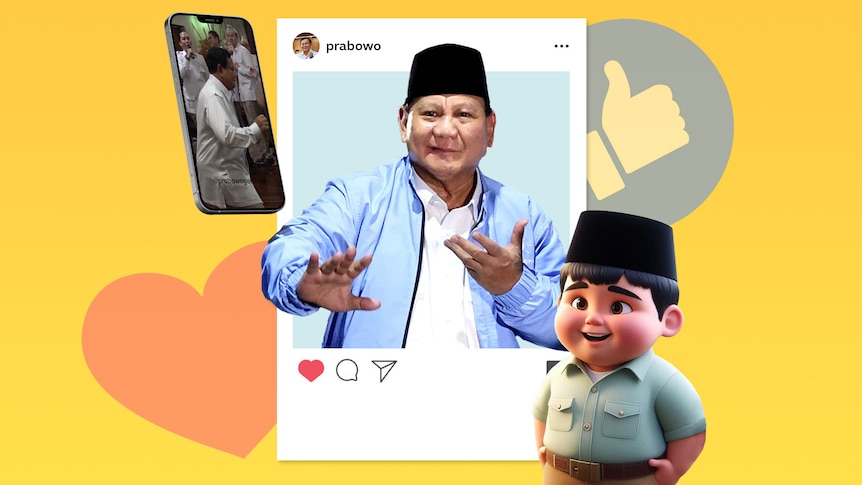
AI in Election Campaigns: A Game-Changer in Indonesian Politics
During the Indonesian elections, a notable advancement in AI technology was the extensive integration of generative AI artwork in campaign materials. Ms. Harbath, an expert in the realm of technology and democracy, highlighted this innovative approach.
One significant application of AI in election campaigns was the transformation of Prabowo Subianto, a former ex-special forces commander with a controversial past, into a whimsical cartoon avatar. This strategic makeover aimed to reshape his public image.
The cartoon avatar gained immense popularity, being featured on various platforms such as posters and TikTok videos, ultimately overshadowing Mr. Prabowo’s actual appearance, according to some analysts.
Following the elections, Mr. Prabowo declared his victory, marking a pivotal moment in Indonesian political history.
Campaigning from Prison with AI-Generated Deepfakes
In the recent Pakistani elections, AI technology significantly influenced the campaign strategy, enabling former prime minister Imran Khan to engage with voters while incarcerated.
Throughout a span of two months, the PTI party, led by Mr. Khan, released four deepfake videos explicitly indicating the use of AI. In these videos, an AI-generated version of Mr. Khan communicated with his supporters, showcasing the potential of AI in election campaigns.
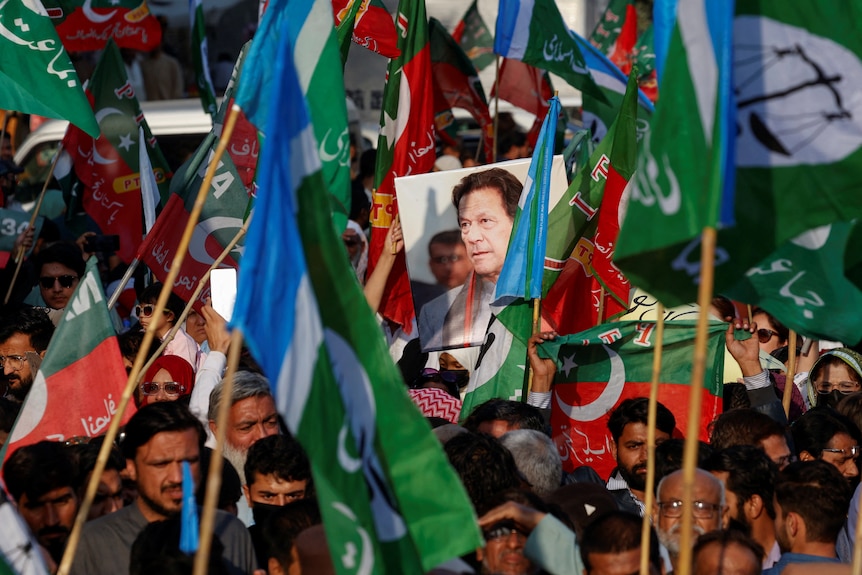
Supporters of Imran Khan’s PTI party took to the streets to protest accusations of electoral fraud in the recent elections, as reported by Reuters photographer Akhtar Soomro.
In response to the situation, Jibran Ilyas, the PTI’s social media coordinator, highlighted the significant impact of the videos that surfaced during the protests. He expressed, “The videos had a profound effect on people. It was a pleasant surprise for them to hear their leader’s voice even while he was incarcerated. We had never organized a political gathering without an Imran Khan speech in the past 26 years.”
Utilizing technology from the US-based company ElevenLabs, the videos were created using archived footage of Imran Khan and written messages he had conveyed from prison, where he was prohibited from recording audio or video. Following the unexpected landslide victory announced by PTI in February, an AI version of Imran Khan was featured delivering the victory speech. Jibran Ilyas shared, “The moment was incredibly moving, with people shedding tears due to the emotional impact.”
Since the election results were declared, there have been widespread allegations of vote tampering orchestrated by the government, casting a shadow of doubt over the legitimacy of the outcome. The use of AI in election campaigns has become a focal point in the ongoing discussions surrounding the integrity of the electoral process.
The Influence of AI in Election Campaigns
The utilization of AI in election campaigns goes beyond the living, as seen in the case of Imran Khan.
Instances in India showcase the resurrection of deceased politicians to endorse current candidates.
Muthuvel Karunanidhi, a prominent figure in Indian cinema and politics, has made appearances at various public functions despite passing away in 2018.
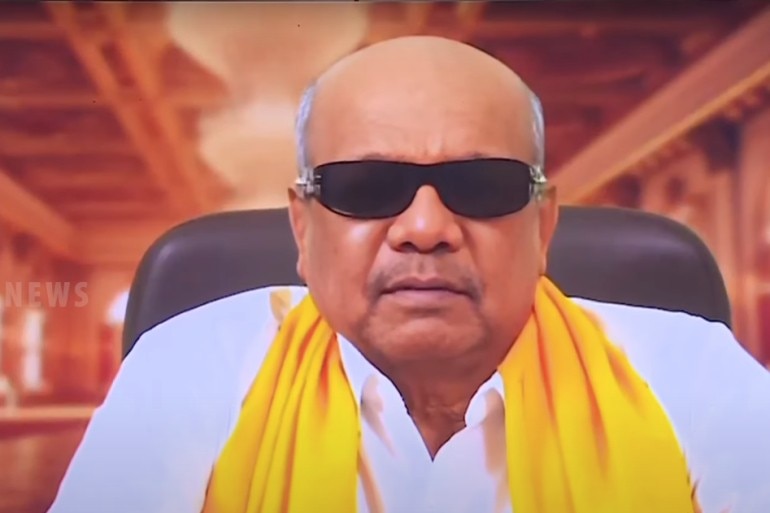
**Utilizing AI in Election Campaigns**
**Rephrased Paragraph:**
A snapshot from a deepfake video featuring Muthuvel Karunanidhi addressing a book launch event is showcased, typically projected on a screen above a platform. In this altered version, he commends the leadership of his son, MK Stalin, who serves as the chief minister of Tamil Nadu. Senthil Nayagam, the founder of Muonium, a tech company responsible for creating the deepfake of Mr. Karunanidhi through accessible software, anticipates a high demand for such videos. His company has successfully replicated the voices of 45 present and past Indian political figures, including Mahatma Gandhi, in preparation for the upcoming Indian elections. These replicated voices can aid political candidates in communicating with voters who speak different languages, given India’s diverse linguistic landscape. Nayagam highlighted the ability to translate Prime Minister Modi’s speeches into 30 languages as a demonstration of this technology’s potential. Additionally, he foresees deepfakes being used for nostalgic purposes, where political parties could introduce replicas of revered former leaders, especially in cases where current leaders lack popularity. Nayagam emphasized that the application of deepfakes extends beyond India, proposing scenarios like former US President Reagan delivering speeches during US elections.
What Can We Expect in 2024 Regarding AI in Election Campaigns?
Impact of AI in Election Campaigns
Can you identify a news piece generated by a chatbot? The emergence of Generative AI is revolutionizing how we consume content, fundamentally altering the landscape of journalism.
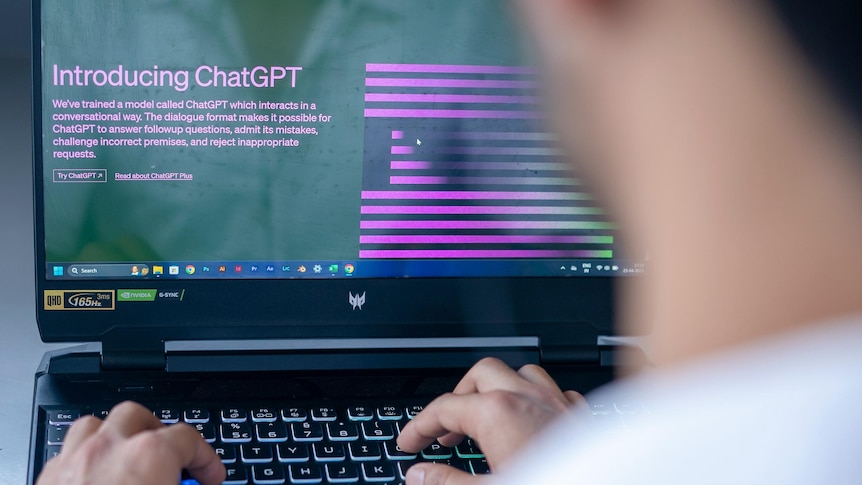
AI in Election Campaigns: Tech Giants Take Precautions to Safeguard Democratic Processes
Last week, a coalition of tech industry leaders, including Microsoft, Meta, Google, Amazon, X, OpenAI, and TikTok, came together to pledge their commitment to proactively implement measures to safeguard democratic elections globally. This voluntary agreement focuses on the responsible use of AI tools to prevent any potential disruptions during electoral processes.
The primary objective of this pact is to combat the dissemination of misleading AI-generated content designed to deceive voters. This includes the creation of deceptive audio, video, and images that mimic the appearance, voice, or actions of political candidates and other significant figures involved in the electoral process.
While the agreement addresses the issue of harmful AI-generated content, its stance on consensual deepfakes, such as those produced by Mr. Khan, remains ambiguous and subject to further clarification.
In Australia, the responsibility of monitoring electoral communications falls partially on the Australian Electoral Commission (AEC). A spokesperson from the AEC emphasized the importance of being vigilant against the potential misuse of AI and deepfakes to spread misinformation or disinformation about electoral procedures.
Despite the advancements in AI technology, the regulations concerning the authorization of electoral communications have not undergone any significant changes. For instance, videos must include both written and spoken authorization messages at the conclusion of the content, while telephone calls must feature a spoken authorization message at the beginning of the call, irrespective of the content’s origin.
While concerns about deepfakes impacting the integrity of elections are valid, some experts caution against exaggerating the risks, as it could erode public trust in electoral information. Overemphasizing the negative implications of AI may lead to widespread skepticism among voters, potentially undermining the democratic process.
Ms. Harbath highlighted the importance of distinguishing between the perception of AI’s prevalence and its actual application. She expressed concerns that an exaggerated narrative surrounding AI could contribute to a decline in trust within the information ecosystem, emphasizing the need for a balanced approach in discussing AI technologies.
In Indonesia, Mrs. Farah emphasized the irreversible trend towards utilizing AI for electoral analysis. She emphasized the utility of AI not only during elections but also in post-election scenarios, enabling a more focused examination of prevalent issues within electorates. Mrs. Farah predicted widespread adoption of AI tools across various electoral processes in the near future.
Get the Latest Updates on AI in Election Campaigns
